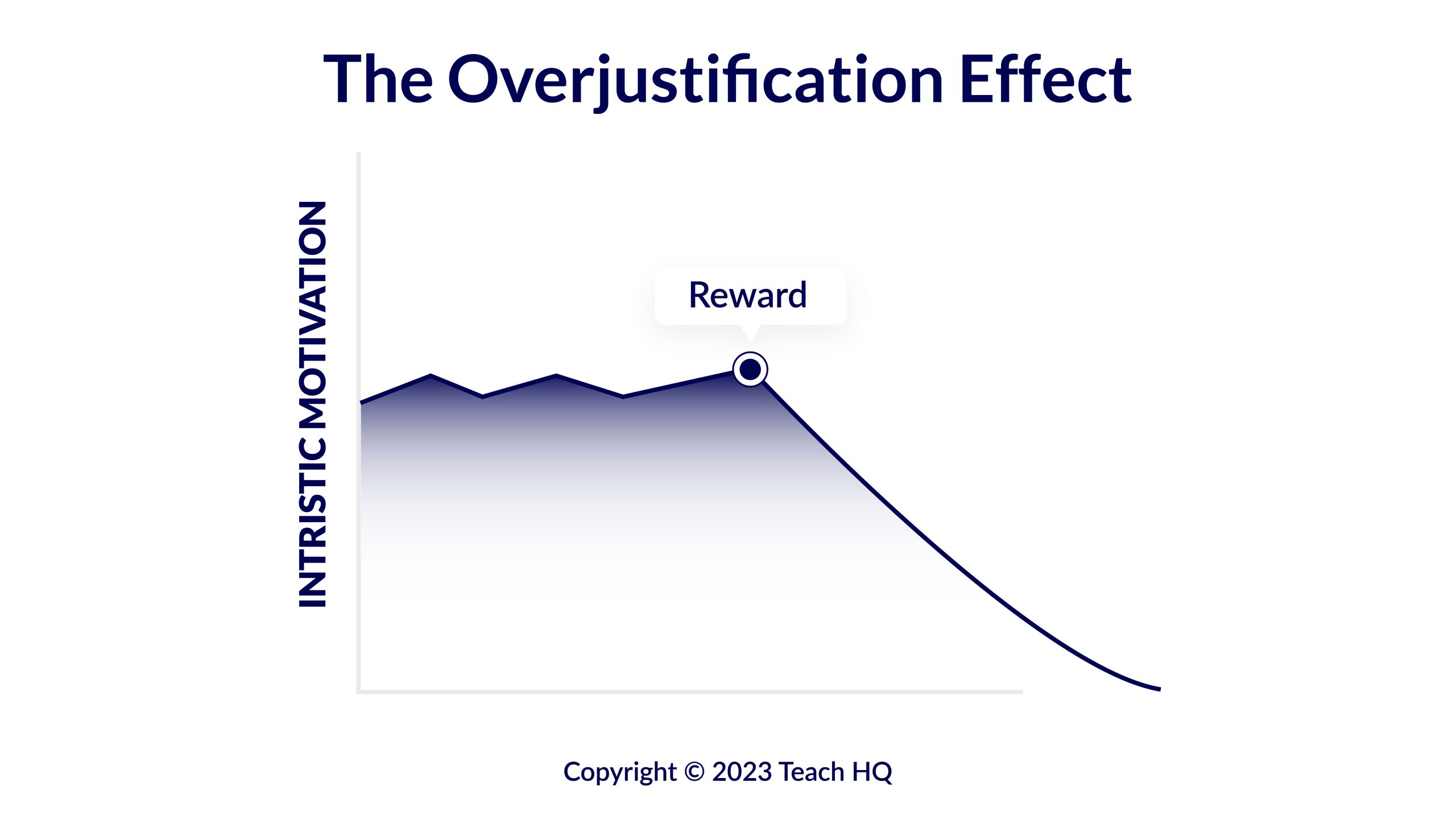Finding ways to motivate students has always been the key to unlocking academic success. The question is, to what extent should educators rely on external motivators to incentivise their students to achieve? Introducing a system based on external rewards, like certificates and prizes, might seem like a surefire way to improve performance in the classroom. However, the reality is not quite that straightforward. The Overjustification Effect occurs when an extrinsic reward decreases your intrinsic motivation to do something – a highly counterproductive result. In this article, we'll explore this phenomenon's influence on educational methods and policy and the necessary equilibrium between external incentives and internal drive. Research by scholars such as Deci, Koestner, and Ryan suggests that these extrinsic motivators might actually hinder the inherent motivation for activities like reading. In a more extensive review, Lepper, Greene, and Nisbett found that although external rewards might initially improve performance, they often lead to a reduction in internal motivation over time. This outcome has significant implications for those designing curriculums and teaching strategies, especially when aiming to maintain student engagement for extended periods.

The Risks and Concerns of Overjustification
Diminishment of Intrinsic Motivation
A primary concern with the Overjustification Effect is its tendency to reduce intrinsic motivation. When students receive external rewards for activities they naturally enjoy, like reading or engaging in puzzles, their internal desire to participate in these activities may diminish. Deci, Koestner, and Ryan's study in 1999 supported this, showing that external rewards can negatively affect intrinsic motivation, especially when these rewards are predictable or performance-based.
Effect on Academic Performance
While extrinsic rewards may boost performance in the short term, the long-term implications can be less certain. Studies have shown that when intrinsic motivation declines, so does the depth of learning and understanding. Students might focus on memorisation or superficial comprehension to secure rewards rather than grasping knowledge's intrinsic value and interconnectedness. This creates an educational environment that is not conducive to fostering critical thinking skills or lifelong learning.
Long-term Impact on Learner's Relationship with Education
The Overjustification Effect can have long-term repercussions on a learner's relationship with education. When extrinsic rewards cease, the diminished intrinsic motivation can lead to a lack of interest in educational activities generally or even a lack of love for learning itself! This is particularly concerning given the extended periods of education and continuous learning required in today's rapidly changing employment landscape.
Mitigating the Overjustification Effect
Understanding the Overjustification Effect is the first step toward mitigating its impact. Educators may consider implementing a more appropriate reward system that includes unexpected rewards, praise for natural skills or effort, and encouragement of self-assessment. For example, rather than giving a prize for every book read, educators could foster a classroom culture where the joy of learning becomes the reward.
Best Practices According to Educational Directives
In terms of compliance with educational standards such as those set by Ofsted, it's crucial to focus on holistic approaches that emphasise the importance of intrinsic motivation. Ofsted guidelines indicate that fostering an intrinsic love of learning is crucial to effective teaching. Educators should look to blend extrinsic and intrinsic motivational methods, considering the student's age, preferences, and past experiences with learning. Recent studies have provided further insight into ways educators can minimise the Overjustification Effect. A 2018 study by Hulleman et al., for instance, suggests that connecting learning activities to students' long-term goals can help sustain intrinsic motivation, even when extrinsic rewards are in play. Similarly, a study by Zusho (2017) proposes that contextualising learning within real-world applications can lessen the focus on external rewards.
Case Study: Implementing Balanced Motivational Strategies in Woodland Primary School
Woodland Primary School embarked on a year-long experiment centred around student motivation in their English Literature classes to mitigate the Overjustification Effect. The school's primary aim was to harmonise extrinsic and intrinsic motivators to enhance educational quality whilst meeting compliance standards. Initially, the school used a points-based system where students earned points for reading books, which could be traded for small prizes. However, educators noticed a decline in students' enthusiasm for reading unless points were involved, echoing the outcomes documented in many of the studies outlined above. The teaching staff revised the system after considering the guidelines of Ofsted and educational research. Instead of awarding points for each book read, teachers encouraged classroom discussions about books. They created project-based assessments where students could explore themes or characters that interested them. This approach was designed to reignite intrinsic motivation by connecting reading to students' natural curiosities and broader life goals. After implementing these changes, reading engagement improved, and the quality of student interaction around literature also saw a significant rise. Teachers noted that students seemed to find the act of reading itself rewarding, indicating a successful reduction in the Overjustification Effect. The case study of Woodland Primary School proves that a more balanced approach between intrinsic and extrinsic motivators can significantly improve the quality of education that is being delivered. 
In Summary
The Overjustification Effect poses a significant challenge in educational settings, where balancing extrinsic and intrinsic motivation is essential for fostering a lasting love of learning. While extrinsic motivators like rewards and certificates can produce short-term improvements, they potentially undermine intrinsic motivation, impacting the depth and longevity of learning. The case study of Woodland Primary School illustrates how educators can effectively counteract the Overjustification Effect. Shifting from a reward-focused approach to one that emphasises values such as curiosity, personal relevance, and the joy of learning can create a more engaging and sustainable learning environment. This approach aligns with educational directives and research advocating for a nuanced use of motivational strategies. In refining our practice, the focus should be on fostering a love for learning, encouraging self-assessment, and connecting academic pursuits to real-world applications and personal goals. By doing so, educators can prepare students with both knowledge and a passion for learning that persists beyond the classroom. This balanced approach to motivation in education is necessary for developing well-rounded, lifelong learners.
Recommended Reading & Resources
- Drive by Daniel H. Pink - A look at what motivates us and how we can apply these insights in various facets of life, including education.
- Mindset by Carol S. Dweck - Explores the concept of "fixed" vs "growth" mindsets in the context of educational achievement.
- Self-Determination Theory by Richard M. Ryan and Edward L. Deci - Provides a foundational understanding of intrinsic and extrinsic motivation.
- The Hidden Lives of Learners by Graham Nuthall - Focuses on the learner's perspective in educational settings.
- Punished by Rewards by Alfie Kohn - A critical examination of the pitfalls of a reward-based system.
- The Power of Mindful Learning by Ellen J. Langer - Discusses the importance of mindful engagement in the learning process.
- Flow: The Psychology of Optimal Experience by Mihaly Csikszentmihalyi - Introduces the concept of 'Flow' and its relation to intrinsic motivation.
- The Motivated Brain by Gayle Gregory and Martha Kaufeldt - Tips and strategies to enhance motivation in an educational context.
- Transformative Experience by L. A. Paul - How experiential learning impacts decision-making and motivations.
- The Art of Changing the Brain by James E. Zull - Discusses the neuroscience of learning and its implications for education.

